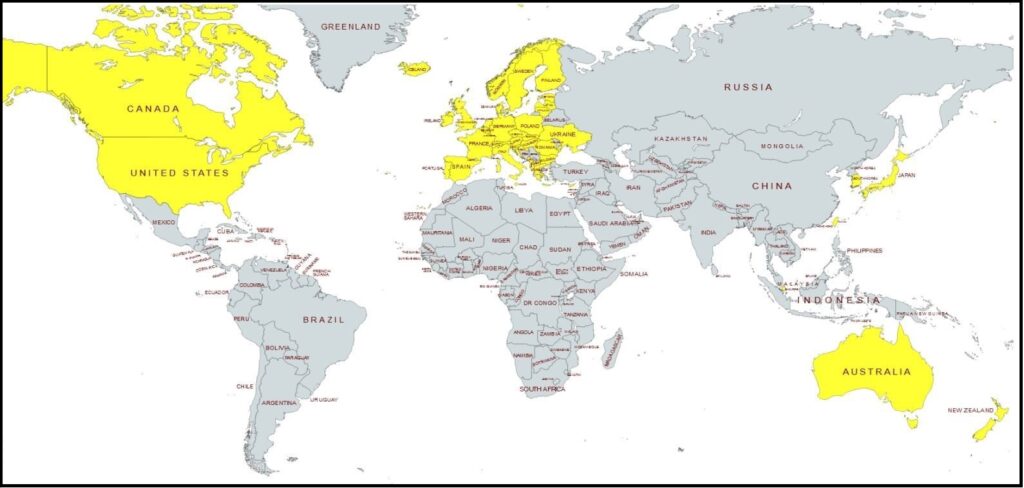The Outlier of the West, Japan Core Inflation Rises 2.4% Year Over Year
If you have been following along, you might remember the note we made in July about not every country willing to go along with the western agenda on energy reduction, climate change, and raising interest rates to shrink their economy down to the scale of diminished energy development {Go Deep}.
 In addition to Russia, China, Iran, Brazil, South Africa, Argentina and India vociferously retaining their own economic and monetary independence, Mexican President AMLO literally blasted the program while visiting the White House and the Bank of Japan refused to join the mantra to raise interest rates. Essentially, all of the aforementioned nations see the collective Build Back Better program for what it is, a path to poverty.
In addition to Russia, China, Iran, Brazil, South Africa, Argentina and India vociferously retaining their own economic and monetary independence, Mexican President AMLO literally blasted the program while visiting the White House and the Bank of Japan refused to join the mantra to raise interest rates. Essentially, all of the aforementioned nations see the collective Build Back Better program for what it is, a path to poverty.
As a result of their non-compliance with the global bankers, which, not coincidentally I would point out, coincided with the assassination of Shinzo Abe, the government of Japan has been getting blasted by the proverbial ‘west’ (U.S, Canada, U.K, Europe and Australia).
Japan is attempting to deal with inflation by focusing on increasing energy production and security (the supply side); while the rest of the western group have been chasing the false promise of decreased inflation by lowering the demand side, ie. pretending not to know their energy policy is creating the increases in costs.
As a result of the distinctly different monetary approaches, the financial system has been trying to punish Japan and the financial media have been trying to point out every flaw in the Japanese economy as a result of their noncompliance. However, as you will see in this Reuters article, the July inflation within Japan is moderating. Inflation in Japan is 2.4% for July (year over year).
TOKYO, Aug 19 (Reuters) – Japan’s core consumer inflation accelerated in July to its fastest in seven-and-a-half years, driven by fuel and raw material prices and adding to the costs of living for households yet to see significant wage gains.
In a sign of broadening price pressure, the so-called “core core” index that strips away not just the impact of volatile fresh food but energy prices, also rose in July at the fastest annual pace in more than six years.
While inflation exceeded its 2% target for four straight months, the Bank of Japan (BOJ) is likely to remain an outlier in keeping monetary conditions ultra-loose with price rises still modest compared with other major economies.
“Food prices and a weak yen were the main culprits behind accelerating inflation,” said Yoshimasa Maruyama, chief market economist at SMBC Nikko Securities, adding that he expects core consumer inflation to reach 3% this year. (read more)
It is funny to see Reuters put out a *shock* styled article for 2.4% core inflation. In the U.S. Joe Biden would be celebrating 2.4% inflation right now; however, his energy policy is driving that CORE inflation number well beyond 6%.
Japan is still in a tough place with increasing prices for their citizens, but it is nowhere near the scale of Europe and North America.
While their currency is suffering from not following the western agenda, they have several upsides. First, exports from Japan to the United States and the EU now become even cheaper. With a higher dollar value, Japanese imports into the United States come at a discount. This will help Japan export goods and retain a strong export economy.
Second, with Japan already a massive investor inside the United States, the dollars that are generated in profit from their operations are delivered back to Japan at a higher value. A higher dollar value, the outcome of their breaking from the western central bank decision to raise rates, does not hurt Japan. They bring back high valued dollars from their decades in investment into North America, and they continue exporting to the U.S. at a discount.
So, the nationalist outlooks of Japan, Brazil and even our Mexican neighbors are reflecting a pragmatic self-interest that so far has withstood the pressures from the western alliance to fall into line. This is how those three countries are positioned to push back against the insufferable BBB agenda.
We can use the example of those western industrialized nations to show that not everyone is in alignment with this globalist multinational finance and corporate takeover.





Post a Comment